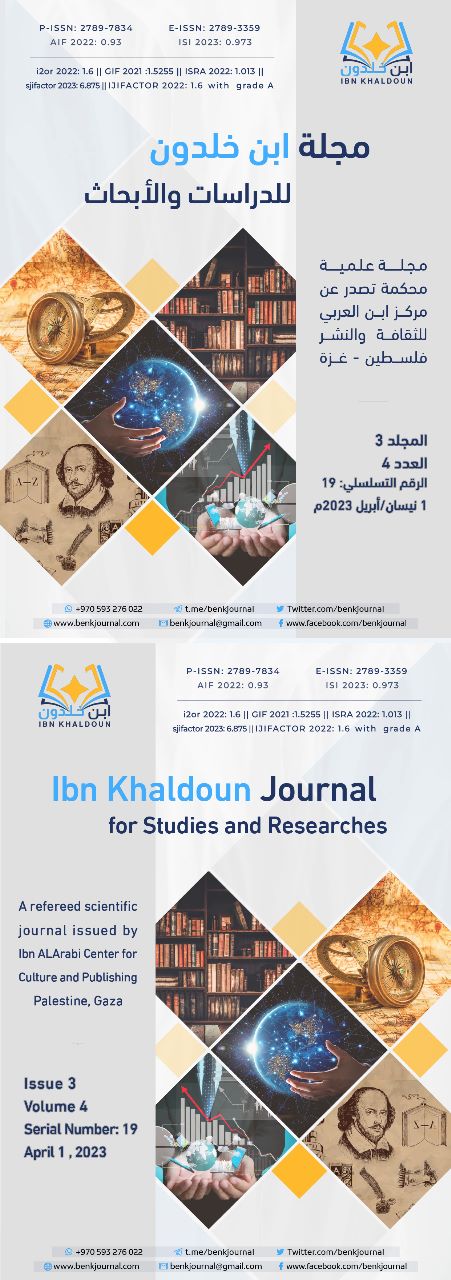The Exegesis’s Significance from the Fundamentalists and Interpreters’ Point of View
Main Article Content
Abstract
Interpreters, in studying indicator’s significance, have a different goal from that of fundamentalists, although both of them search in the same Qur’anic text, using this term. Such a difference has generated a number of issues related to the concept and function of the indicator for each side. Therefore, this study aims to find appropriate answers for these issues by showing the concept, purpose and function of what is indicated by both fundamentalists and interpreters, in comparing both standpoints. In fact, the nature of the study dictated that researchers rely on the analytical inductive approach, which has helped reaching a set of results. Among these results, the fact that the function of the indicator, from the interpreters’ point of view, is different from its function for the fundamentalists. The reason behind this difference is that interpreters aim through it to elucidate and remove the ambiguity in order to reach the meaning that the Qur’anic text bears, while the fundamentalists aim through it to clarify the meanings of the Qur’an in order to derive legal rulings. The fundamentalists’ definition of the indicator is compatible with their approach of interpretation, and the interpreters’ definition of the indicator is compatible with their approach, as well. The interpreters did not carry out special searches or chapters for indicator’s significance, whereas fundamentalists have carried out special investigations on the issue. The study recommended paying attention to this type of terminology, so as to study it independently in order to show, simplify and bring it closer, in a new way serving readers and interested people.
Metrics
Article Details

This work is licensed under a Creative Commons Attribution-NonCommercial 4.0 International License.
References
جمـــال الـــدین أبـــو الفـــضل محمـــد ابن منظـــور، لـــسان العـــرب، ط 3 دار صادر، لبنان بیروت، سنة النشر: ١٤١٤ه.
ــ أحمد بن فارس بـن زكریـا أبو الحسین، "معجـم مقـاییس اللغـة"، المحقـق: عبـد السلام محمد هارون، "دار الفكر، ١٣٩٩هـ - ١٩٧٩م" .
فاضل مدب متعب، "وظائف علوم القرآن بین المفسرین والأصولیین"، رسالة دكتوراه، جامعــة الكوفــة، كلیــة الفقــه، سنة النشر: ١٤٣١هـــ - ٢٠١٠م.
ــ محمــد ابن الحــسن الــرازي أبــو عبــد االله، "مفــاتیح الغیــب التفـــسیر الكبیـــر"، ط٣، "دار إحیـــاء التـــراث العربـــي - بیـــروت - ١٤٢٠ هـــ"ـ.
ــ محمـــود بـــن عبــــد االله شـــهاب الـــدین الحـــسیني الألوســـي، "روح المعـــاني فــــي تفـــسیر القـــرآن العظـــیم والـــسبع المثـــاني"، ط١، (دار الكتب العلمیة – بیروت، ١٤١٥هـ).
ــ محمد بن أحمد القرطبـي أبو عبد االله، "الجـامع لأحكـام القـرآن ط2، (بیـروت: مؤسـسة الرسالة ، ١٤٢٧هـ - ٢٠٠٦م).
ــ عبــــد الكــــریم ابن محمــــد النملــــة، "المهــــذب فــــي علــــم أصــــول الفقــــه المقــارن، تحریــر لمــسائله ودراســتها دراســة نظریــة تطبیقیــةً"، ط ١، الریــاض: مكتبة الرشد، ١٤٢٠هـ - ١٩٩٩م.
ــ محمد بن محمـد أبو حامد الغزالـي، "لمستـصفى مـن علـم الأصـول"، طباعة، شركة المدینـة المنـورة للطباعـة، المدینـة المنـورة.
ــ علي ابن حزم أبو محمد الأندلسي الظاهري القرطبي، "الإحكــــام فــــي أصــــول الأحكـــام"، علـــق علیـــه الـــشیخ عبـــد الـــرزاق عفیفـــي ط ١ (المكتـــب الإســـلامي، بیـروت).
ــ بـدر الـدین محمـد ابن بهـادر أبـو عبـد االله الزركـــشي، "البحـــر المحـــیط فـــي أصـــول الفقـــه"، ١ (دار الكتبـــي ، ١٤١٤هــــ - ١٩٩٤م).
ــ أبــو الحــسین محمــد بــن علــي البــصري الطیــب، "المعتمــد فـــي أصــول الفقـــه"، ط ١، (دار الكتـــب العلمیـــة، بیــروت: ١٤٠٣هـــ).
ــ عبــد الملــك ابن یوســف إمــام الحــرمین الجــویني، "البرهــان فــي أصــول الفقــه"، ط ١، (دار الكتــب العلمیــة بیــروت – لبنــان، ١٤١٨هـــ - ١٩٩٧م)
ــ محمد بن سلیمان العرینـي، "قاعـدة الاقتـصار فـي مقـام البیـان یفیـد الحـصر، دراسـة تأصـیلیة – تطبیقیـة، (مجلـة الجمعیـة الفقهیـة بالریـاض، العـدد الثـاني عشر، صفر، جمادى الأولى، ١٤٣٣ه- ٢٠١١م).





